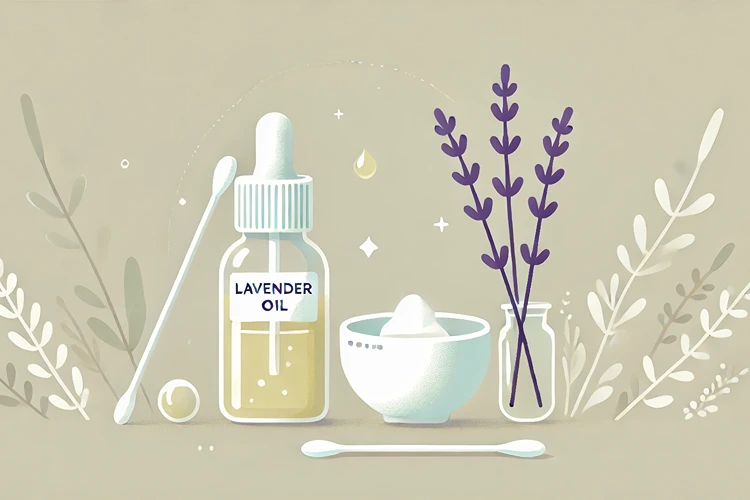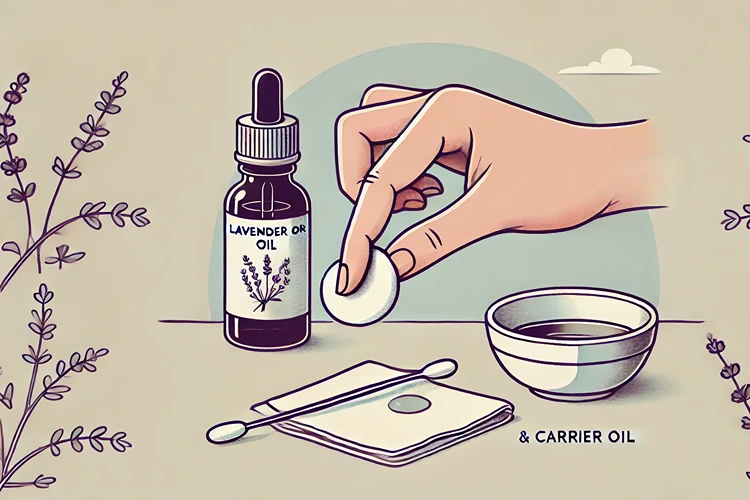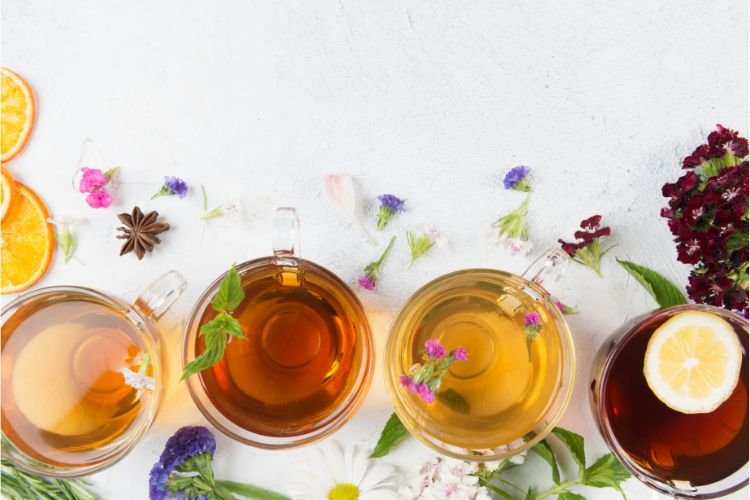
Lavender Oil Uses for Skin Health and Healing
Lavender oil has been celebrated for centuries as a versatile and effective natural remedy, especially when it comes to skin health and healing. This fragrant essential oil, extracted from the lavender plant’s flowers, has become a staple in holistic wellness for its calming properties and numerous benefits for the skin. But what makes lavender oil so special for skin care? Let’s explore how this potent oil can enhance your skin’s health and aid in healing, all while keeping things simple and natural.
Why Is Lavender Oil Good for Your Skin?
Lavender oil is packed with beneficial compounds that make it an ideal choice for various skin concerns. Whether you’re dealing with acne, dry skin, or minor wounds, lavender oil can help improve your skin’s condition. Here’s why:
- Anti-inflammatory Properties: Lavender oil is known for its ability to reduce inflammation, making it great for soothing irritated skin and reducing redness.
- Antimicrobial Effects: The oil has natural antimicrobial properties, which help fight off bacteria and fungi that can cause skin infections or aggravate acne.
- Antioxidant Rich: Lavender oil is full of antioxidants, which help protect your skin from free radicals and environmental damage.
- Calming and Healing: The soothing scent of lavender isn’t just for relaxation—it also helps in the healing process, making it effective for minor cuts, burns, and insect bites.
Lavender oil’s combination of these properties makes it a powerful, natural option for promoting skin health and healing.
How to Use Lavender Oil for Acne

Acne can be a frustrating and persistent skin issue, but lavender oil offers a natural remedy that may help reduce breakouts and promote clearer skin. Here’s how you can use lavender oil to tackle acne:
Direct Application
Lavender oil can be applied directly to acne spots, but it’s important to dilute it with a carrier oil like jojoba or coconut oil to avoid irritation. Simply mix a few drops of lavender oil with your chosen carrier oil and dab it onto the affected areas using a cotton swab.
Adding to Your Skincare Routine
Incorporating lavender oil into your daily skincare routine is easy. Add a few drops to your moisturizer or facial oil to enjoy its benefits without changing your routine drastically. This method helps to keep your skin hydrated while fighting acne-causing bacteria.
Helpful Hint:
If you have sensitive skin, perform a patch test before applying lavender oil to your face. Mix one drop of lavender oil with a teaspoon of carrier oil and apply it to a small area of skin. Wait 24 hours to see if any irritation occurs before using it on larger areas.
Lavender Oil for Dry Skin and Eczema
Dealing with dry skin or eczema can be uncomfortable, but lavender oil offers a natural way to soothe and moisturize your skin. Here’s how you can use it:
Hydrating Bath
Adding a few drops of lavender oil to your bath can help hydrate and soothe dry, irritated skin. The warm water opens up your pores, allowing the oil to penetrate deeply and provide much-needed moisture.
DIY Lavender Body Butter
Creating your own lavender-infused body butter is a great way to combat dry skin daily. Mix shea butter, coconut oil, and a few drops of lavender oil to create a rich, moisturizing cream that you can use all over your body.
Stats:
According to a study published in the Journal of Alternative and Complementary Medicine, lavender oil significantly improves skin barrier function and hydration in individuals with dry skin.
Lavender oil’s ability to calm inflammation and moisturize makes it an excellent choice for those struggling with dry skin or eczema. Its gentle nature ensures that your skin stays hydrated without being overwhelmed by harsh chemicals.
Lavender Oil for Healing Wounds and Burns

Lavender oil has long been used as a natural remedy for minor wounds and burns, thanks to its antibacterial and healing properties. Here’s how you can use lavender oil for skin injuries:
Treating Minor Burns
For minor burns, lavender oil can provide soothing relief and aid in the healing process. Dilute the oil with a carrier oil and gently apply it to the burn area. The oil helps reduce pain, inflammation, and the risk of infection, promoting faster healing.
Healing Cuts and Scrapes
Lavender oil can be a great natural alternative to conventional antiseptics for treating cuts and scrapes. After cleaning the wound, apply diluted lavender oil to the area to help prevent infection and reduce scarring.
Helpful Hint:
For an added boost in wound healing, combine lavender oil with honey, which also has antibacterial properties. Apply the mixture to the wound and cover it with a bandage for optimal healing.
Lavender Oil for Scar Reduction
Scars can be stubborn and take a long time to fade, but lavender oil can help speed up the process. Its regenerative properties promote the growth of new skin cells, helping to reduce the appearance of scars over time.
Massage Therapy
Gently massaging lavender oil onto scars can improve circulation and promote healing. Dilute the oil with a carrier oil and massage the area in circular motions daily to see gradual improvements in scar texture and color.
Overnight Treatment
For more intensive treatment, apply lavender oil before bed and let it work overnight. This allows the oil to penetrate deeply into the skin and promote healing while you sleep.
Stats:
A clinical trial published in Phytotherapy Research found that patients who applied lavender oil to surgical scars saw significant improvements in scar appearance compared to those who did not.
Lavender Oil for Anti-Aging and Skin Renewal
As we age, our skin naturally loses some of its elasticity and youthful glow. However, lavender oil can help slow down the signs of aging by promoting skin renewal and reducing the appearance of fine lines and wrinkles. Here’s how lavender oil can support anti-aging efforts:
Enhancing Collagen Production
Collagen is a protein that helps maintain skin’s elasticity and firmness. Lavender oil stimulates collagen production, which is essential for keeping skin youthful. By applying diluted lavender oil regularly, you can support your skin’s natural collagen production, helping to reduce wrinkles and keep your skin looking smooth.
Promoting Skin Cell Regeneration
Lavender oil’s regenerative properties encourage the turnover of skin cells, which is vital for maintaining a youthful appearance. This process helps to diminish age spots and smooth out rough patches, leaving your skin with a more even tone and texture.
Soothing Stress-Related Aging
Stress can accelerate the aging process, often leading to premature wrinkles and dull skin. The calming effects of lavender oil not only soothe your mind but also your skin. Incorporating lavender oil into your nightly routine can help relax your facial muscles and reduce the impact of stress on your skin.
Helpful Hint:
Combine lavender oil with rosehip oil for an effective anti-aging serum. Rosehip oil is rich in vitamins A and C, which work in tandem with lavender oil to boost collagen production and enhance skin renewal.
How to Choose and Store Lavender Oil for Maximum Benefits
The quality and storage of lavender oil are crucial for ensuring you reap its full benefits. Here’s what you need to know about selecting and storing lavender oil:
Choosing High-Quality Lavender Oil
Not all lavender oils are created equal. To get the most out of your lavender oil, choose one that is 100% pure and labeled as therapeutic grade. This ensures that the oil has not been diluted or mixed with synthetic ingredients, which can reduce its effectiveness.
Storing Lavender Oil
Proper storage of lavender oil is key to maintaining its potency. Keep your lavender oil in a cool, dark place, away from direct sunlight and heat. Using a dark glass bottle helps protect the oil from light exposure, which can degrade its beneficial properties over time.
Checking for Freshness
Lavender oil has a shelf life, typically around 1-2 years. To check for freshness, give the oil a sniff—if it smells off or has lost its signature scent, it’s time to replace it. Using fresh lavender oil ensures you’re getting the most benefits for your skin.
Lavender Oil Blends: Enhancing Skin Health with Synergy
Combining lavender oil with other essential oils can enhance its benefits and provide additional support for your skin. Here are a few powerful blends to consider:
Lavender and Tea Tree Oil for Acne
Tea tree oil is renowned for its acne-fighting properties, making it a perfect partner for lavender oil. Mix a few drops of each with a carrier oil and apply to acne-prone areas to reduce breakouts and soothe inflammation.
Lavender and Frankincense Oil for Anti-Aging
Frankincense oil is another potent anti-aging oil that complements lavender’s skin-renewing effects. Together, they create a powerful serum that can help reduce wrinkles and improve skin elasticity.
Lavender and Chamomile Oil for Sensitive Skin
If you have sensitive skin, chamomile oil’s gentle and soothing properties make it a great companion for lavender oil. This blend is perfect for calming irritation and reducing redness, leaving your skin feeling soft and nourished.
Lavender Oil Uses for Specific Skin Concerns
| Skin Concern | How Lavender Oil Helps |
|---|---|
| Acne | Reduces inflammation, fights bacteria, and promotes clearer skin. |
| Dry Skin | Moisturizes and soothes dry patches, helping to restore the skin barrier. |
| Minor Burns | Provides pain relief, reduces inflammation, and accelerates healing. |
| Scarring | Promotes skin cell regeneration, reducing the appearance of scars. |
| Aging | Enhances collagen production, reduces wrinkles, and promotes youthful skin. |
Precautions and Considerations When Using Lavender Oil
While lavender oil is generally safe for most people, there are some precautions to keep in mind to ensure you use it effectively and safely:
Patch Testing
Before using lavender oil on your face or other sensitive areas, always perform a patch test. Apply a small amount of diluted lavender oil to your inner arm and wait 24 hours to check for any adverse reactions.
Allergic Reactions
Although rare, some people may experience allergic reactions to lavender oil. If you notice any redness, itching, or swelling after using lavender oil, discontinue use immediately and consult with a healthcare provider.
Pregnancy and Lavender Oil
If you’re pregnant or breastfeeding, consult with your healthcare provider before using lavender oil, as its effects during pregnancy are not fully understood.
Incorporating Lavender Oil into Your Daily Skincare Routine
Lavender oil can be easily integrated into your daily skincare routine for ongoing benefits. Here are some simple ways to do so:
Morning Routine
Start your day by adding a few drops of lavender oil to your morning moisturizer. This not only hydrates your skin but also helps protect it from environmental stressors throughout the day.
Evening Routine
Incorporate lavender oil into your nighttime routine by mixing it with your favorite serum or facial oil. The calming effects of lavender can help you unwind after a long day while it works to rejuvenate your skin overnight.
Weekly Treatments
Once a week, treat yourself to a lavender-infused facial steam. Add a few drops of lavender oil to a bowl of hot water, cover your head with a towel, and let the steam open up your pores and allow the lavender oil to penetrate deeply.
Using Lavender Oil for Skin Health
Pros
- Natural and gentle on the skin, making it suitable for sensitive skin types.
- Offers a wide range of benefits, including anti-inflammatory, antimicrobial, and antioxidant properties.
- Can be easily incorporated into daily skincare routines, providing long-term skin health benefits.
- Helps reduce acne, soothe dry skin, and accelerate wound healing naturally.
- Widely available and relatively affordable compared to other skincare treatments.
Cons
- Potential for allergic reactions or skin irritation, especially if not diluted properly.
- Some people may find the scent of lavender oil too strong or overwhelming.
- Effectiveness can vary depending on the quality of the oil and individual skin types.
- Not suitable for everyone, particularly those with specific allergies or sensitivities to essential oils.
- Requires careful storage to maintain potency and prevent degradation over time.
FAQs
Wrapping Up
Lavender oil is a versatile and powerful natural remedy that can significantly enhance skin health and healing. From reducing acne and soothing dry skin to promoting collagen production and helping with scar reduction, lavender oil offers a range of benefits that make it a valuable addition to your skincare routine. By understanding how to use lavender oil safely and effectively, you can harness its full potential and enjoy healthier, more radiant skin. Incorporate this timeless remedy into your daily regimen and experience the natural, gentle care that lavender oil provides.


